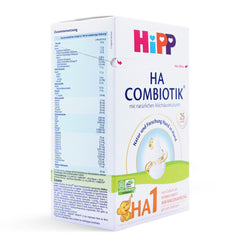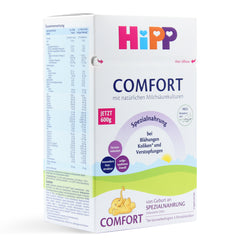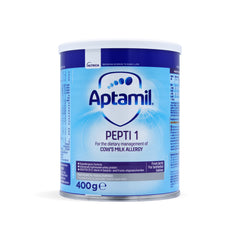Best Formula for Colic: What Really Works for Fussy Babies
A baby crying in the middle of the night can drive even the most patient parents to despair. When a baby cries inconsolably for hours, clenches their fists, and tucks their legs up to their tummy, it is most likely colic — a mysterious phenomenon that affects up to 40% of newborns in the first months of life.
Colic remains one of the most discussed topics in pediatrics. Despite decades of research, the exact causes of this condition are still debated among experts. Immature digestive systems, increased sensitivity to milk proteins, and an imbalance in the intestinal microflora are among the many theories, but there is no universal solution.
The question of nutrition is particularly acute. Parents often ask themselves what formula helps with colic and look for special baby milk for colic, hoping to ease their little one's suffering. However, achieving peaceful nights requires a comprehensive approach, patience, and an understanding of each child's individual needs. Let's take a look at which methods really work.
How Does Baby Formula Affect Colic?
The formula has a significant impact on the health and digestion of the child. Sometimes, baby formula causes colic and brings constant discomfort. The baby's untrained digestive system requires the right choice of a natural and high-quality formula. The wrong choice can cause many problems for both the baby and the parents. For children who are on artificial feeding, the formula is essential.
Anti-colic baby formula is an excellent choice to reduce any symptoms. The right choice of formula will help reduce any inflammation and improve digestion. Here are the key problem ingredients in baby formula:
-
Protein formulas. Can be good but may cause allergic reactions. For babies who have colic, protein formulas are dangerous. Many parents choose hydrolyzed protein, which is safer and doesn't cause allergies.
-
Lactose formula. Helps to improve the necessary amount of carbohydrates for the child. Lactose is often found in breast milk, but it has specific contraindications for babies. Lactose usually causes gas, but high-quality milk for colic babies on a lactose-free basis will be the best choice.
-
Fat content. The composition of fats in baby formula should be of good quality. Natural fats are essential for good digestion of food. High-quality formulas reduce the symptoms of discomfort and pain in the child.
Key Ingredients to Look for in Anti-Colic Formula
When choosing baby food for babies with colic, parents should carefully review the formula's composition to ensure it meets their baby's needs. The best formula for colic babies contains specially selected ingredients that aid digestion and reduce gas formation. Key components that make the formula effective against colic:
-
Hydrolyzed proteins. Pre-digested milk proteins are easier for an infant's immature digestive system to absorb, reducing the risk of allergic reactions and colic.
-
Prebiotics (GOS/FOS). Oligosaccharides promote the growth of beneficial intestinal microflora. They improve peristalsis and create a healthy digestive environment.
-
Probiotics. Live bifidobacteria and lactobacilli restore the balance of the intestinal microflora. It is essential for preventing colic.
-
Reduced lactose content. A reduced amount of milk sugar prevents excessive gas formation in children with lactase deficiency.
-
Medium-chain triglycerides (MCT). Easily digestible fats are quickly absorbed without overloading the digestive system.
The best baby formula for colic should be as close as possible to the composition of breast milk. Modern manufacturers are developing specialized formulas with scientifically proven compositions. These formulas take into account the digestive characteristics of newborns. Choosing the right formula can significantly improve your baby's well-being and the quality of sleep for the whole family. Organic Life Start has proven the quality of some baby formulas through its own experience. That is why we focus primarily on quality. If you're unsure which formula to choose, we can advise you and select the best one for your baby.
What Makes a Formula Truly "Anti-Colic"?
Baby formula for colic will help the baby better digest food and reduce inflammation. Anti-colic formula is the best way to mitigate any risks. Anti-colic formula helps to minimize discomfort in the baby's stomach. Due to high-quality food, the baby receives improved absorption of the formula. The formula aims at reducing pain, gas, bloating, and colic in the baby.
Clinical confirmation helps to understand the quality of the formula with probiotics. Probiotics improve the functionality of digestion in children. Pediatricians recommend formulas for children with certain problems. The occurrence of colic and sensitivity to proteins is a serious obstacle. Well-known brands of quality formulas, such as HiPP and Holle, have a high-quality composition and natural ingredients.
A best formula milk for colic babies has these features:
-
Hydrolyzed proteins that are easier for the baby to digest
-
Reduced lactose or lactose-free composition
-
Probiotics and prebiotics for intestinal microflora
-
Good composition that helps to overcome many problems
Best Infant Formulas for Colic: Top Picks by Category

The best milk for colic babies have a good composition and are hypoallergenic for babies. Good formulas are the best choice for many conscious parents. A high-quality composition helps minimize the risk of colic, abdominal pain, and bloating. Different options will help to understand the best choice of formulas for everyone:
-
Amino acid-based formulas. For children who have severe allergies and intolerance to many products, this formula for colic newborn is the best. Proteins are replaced with amino acids for improved digestion and reduced colic. This formula is the best for reducing any allergic risk.
-
Hydrolyzed formulas. Best for babies with protein sensitivity. The formula is used for the prevention of allergies and improved feeding. Proteins are broken down into small fragments that can be easily digested. A high-quality formula for colic babies helps to maintain the health of the baby.
-
Lactose-free formulas. Excellent example with a minimal lactose content. This formula is best for colicy babies with temporary lactase deficiency. Instead of lactose, other carbohydrates are used that improve digestion.
Best Formula for Colic and Reflux Relief
Choosing the right formula for a baby with colic is no easy task, but modern manufacturers offer specialized solutions to help alleviate symptoms. What formula is good for colic? It depends on the individual needs of the child, but there are proven options that help thousands of families worldwide.
Leading baby food brands for colic relief:
-
HiPP Formula. These are German organic formulas with prebiotics and probiotics. Each option contains natural ingredients that promote healthy digestion and reduce gas.
-
Kendamil Formula. These are British formulas made with whole milk and free from palm oil. This option contains natural MFGM and oligosaccharides to support digestion.
-
Nannycare Formula. These are New Zealand goat milk formulas. This option is ideal for children with a sensitivity to cow's milk protein.
The best infant formula for colic should be chosen based on the individual child's specific symptoms. Our company offers a wide range of European organic formulas that have undergone rigorous certification and have been proven effective in combating colic and reflux in infants. Millions of mothers worldwide trust us and choose us for their children.
Signs Your Baby May Need a Colic-Specific Formula
Understanding the signs that harm the baby is extremely important. Parents will be able to change their choice and choose a quality formula. The best formula for colic and reflux will help reduce symptoms and improve overall well-being. Here is what is essential to understand when changing the formula in the baby's diet:
-
Excessive crying. May indicate the appearance of colic. The baby may cry almost all day and feel irritable. After such a condition, it is essential to check the child's diet.
-
Arching the back. Pinching the legs can be another severe symptom. The child may arch his back due to internal discomfort in the abdomen. The appearance of colic indicates improper feeding.
-
Gas formation. An equally serious problem in the baby is gas formation, which constantly comes with bloating. The child's tummy may be swollen, and certain burping will be felt. A high-quality anti-colic formula will help correct the situation.
-
Refusal to feed. Can indicate discomfort after the formula. This symptom is severe, so it is essential to check the composition of the ingredients. The reaction to pain and discomfort becomes the main sign of colic.
-
Signs of potential allergies. Parents may notice certain signs of potential allergies on the child's skin. Dryness, eczema, and rashes on the body and face indicate intolerance to a particular ingredient.
Best Formula for Babies with Milk Allergy and Colic
The combination of milk protein allergy and colic creates a double problem for parents and babies. The best formula for babies with milk allergy should not only exclude allergens, but also gently support the baby's sensitive digestive system.
Specialized solutions for children with allergies and colic:
-
Hydrolyzed formulas. Cow's milk proteins are completely broken down into amino acids and peptides. This eliminates allergic reactions and facilitates digestion in cases of colic.
-
Goat milk formulas. This is a natural alternative to cow's milk with a lower content of allergenic proteins, easier to digest, and less likely to cause colic. A good example is Holle goat milk formula, a healthy alternative to cow's milk.
-
Soy formulas. These are plant-based formulas that completely exclude milk proteins. This option is suitable for children with multiple food allergies.
-
Amino acid formulas. These contain only free amino acids and are the gold standard for children with severe allergies.
Infant formula for colic with hypoallergenic properties is often supplemented with prebiotics and probiotics to restore healthy gut flora. The individual tolerance of the child determines the best milk for colic.
In the 21st century, a wide selection of hypoallergenic European formulas is available. Choose those that have undergone clinical trials and have shown high efficacy in treating colic in children with milk protein allergies. The right choice of formula can significantly improve the quality of life for the entire family.
Best Formula for Newborns With Colic

The best formula for colic helps improve digestion and reduce allergic reactions. Infant formula is an excellent option for reducing colic. For children aged 0 to 3 months, nutrition is essential. Careful digestion and a balanced diet will help get rid of many problems. The formula helps get rid of any problems with the intestinal tract.
For a newborn, a quality formula helps to feel good and reduce pain. The colic formula is designed for infants from 0 months, which provides good ease of swallowing. The low lactose content helps to avoid any allergic reactions. Careful digestion with this formula becomes possible for the baby.
Formula Options That Help Soothe Colic in the First Weeks
The first few weeks of a baby's life are often a challenging time for the whole family, especially when the baby suffers from colic. During this critical period, choosing the right baby food can be crucial in alleviating symptoms and restoring calm to the home.
Specialized formulas for newborns with colic:
-
HiPP HA Combiotik Stage 1. German hypoallergenic formula with partially hydrolyzed proteins and prebiotics for gentle digestion in the first weeks of life.
-
Aptamil Pepti 1. A special formula with deeply hydrolyzed proteins and MCT fats for babies with severe colic and food intolerances.
-
Holle Goat Dutch Stage 1. A Swiss biodynamic formula made from goat's milk, easily digestible and rarely causing colic, thanks to its special protein structure.
-
Kendamil Goat Stage 1. British whole goat milk formula, free from palm oil, contains natural MFGM to support digestion in newborns.
-
Nannycare First Infant Milk. New Zealand goat milk formula with added prebiotics to promote healthy gut flora.
-
Lebenswert Bio Stage 1. German organic formula with an optimal ratio of whey protein and casein to minimize colic.
The formula to help with colic should be introduced gradually, with careful observation of the baby's reaction to ensure a smooth transition. The formula that helps with colic is critical in the first weeks of life, as the digestive system of a newborn is not yet fully developed.
Organic Life Start offers all of the above European organic formulas, which have undergone strict quality control and are specially designed for sensitive babies in the first weeks of life.
Transitioning to a New Formula: What Parents Should Expect
Changing a baby's formula can be a serious decision for parents. It is essential to consider the composition of the components, the health of your baby, and valuable information. Practical tips will help you switch to proper nutrition for your baby and achieve success. Here are some tips for choosing the best anti-colic formula:
-
Consult a pediatrician about changing the formula for colic babies. The doctor will help check the baby for various symptoms and check for allergic reactions.
-
Transfer the child gradually from one formula to another. Within one week, it is necessary to mix the formula in the correct ratio. First, add a smaller amount of the new formula and gradually increase the volume.
-
Monitor your child's behavior and condition. The color and consistency of the stools will give excellent signs of a change in the formula.
-
Look for improvement in symptoms. Parents should understand that the child feels good and does not have any problems. Good mood and excellent digestion are the main symptoms.
Choosing the right formula for a baby with colic is a challenging task that requires a personalized approach and patience from parents. Colic affects up to 40% of newborns and remains one of the most discussed problems in pediatrics, despite decades of research.
Key factors to consider when choosing an anti-colic formula include hydrolyzed proteins, prebiotics and probiotics, reduced lactose content, and high-quality fats. Special attention should be paid to European organic brands such as HiPP, Holle, Kendamil, and Nannycare, which offer specialized formulas for sensitive babies.
For babies with milk protein allergies, goat's milk, soy-based best formulas, or amino acid-based formulas are suitable. In the first weeks of life, it is essential to gradually transition to a new formula under the supervision of a pediatrician.
Parents should remember that there is no one-size-fits-all solution — what works for one child may not work for another. It is essential to monitor your baby's reaction and adjust your choice as needed. Organic Life Start offers a wide range of high-quality European formulas to help with colic and ensure peaceful nights for the whole family.
Organic Life Start is committed to providing accurate, reliable, and trustworthy information to parents and caregivers. We carefully choose credible sources and follow a meticulous fact-checking process to uphold the highest standards in infant nutrition and parenting advice. To learn more about our dedication to accuracy, please explore our editorial guidelines.
Link To Sources











Cindy Menard -
We struggled with colic for weeks until we learned that not all formulas are created equal when it comes to sensitive tummies. Switching to a formula designed for colic made a noticeable difference in our baby’s comfort, with less arching and fussiness after feeds. It wasn’t an instant fix, but over a few days we saw fewer long crying spells and more relaxed feeding. We also made sure to pace feeds and burp more often to help reduce gas buildup. Every baby is different, so what works for one might not work for another, but having a gentler option definitely helped us.
Brooke Caceres -
December 19, 2025
I never realized that certain formulas designed for colic can actually make a noticeable difference in reducing gas and fussiness. Understanding how protein type and digestion support play a role really opened my eyes to how much choice matters. It’s great to learn about options that might help babies feel more comfortable and parents get more rest. Thanks for the helpful insights!
Salma J -
December 15, 2025
I’ve heard conflicting advice about whether colic improves with gentle formulas or if it’s just something babies outgrow. What has actually worked best for parents dealing with excessive crying and gas?